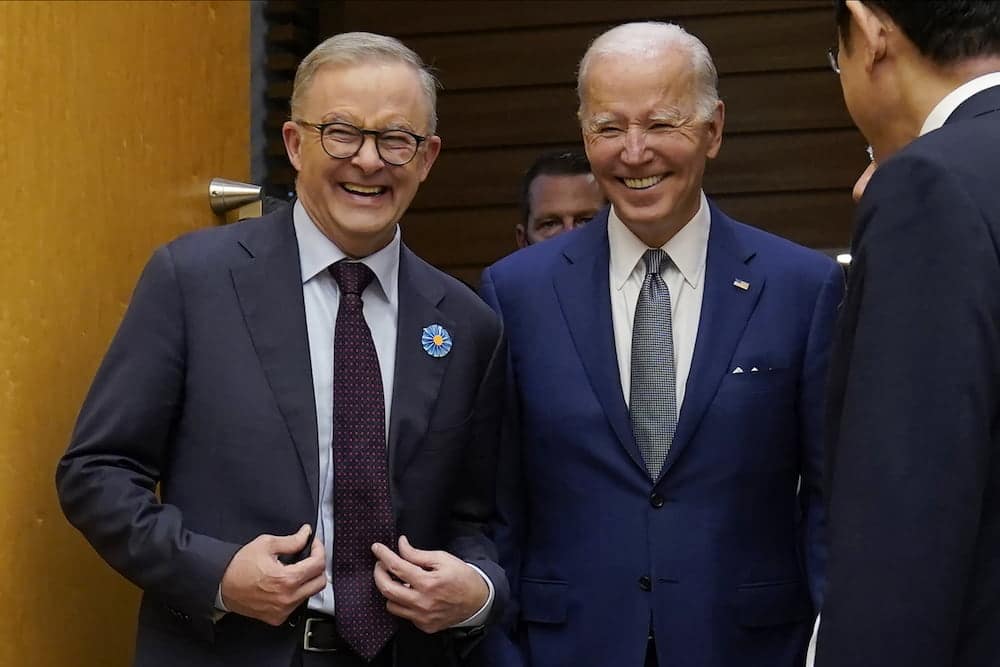Prime Minister Anthony Albanese has concluded high-level talks with leaders from the US, Japan and India and confirmed Australia will host the third in-person Quad leaders summit in 2023.
Mr Albanese said the leaders affirmed their shared commitment to the Quad, and to a “free, open and resilient Indo-Pacific”, with the meeting focusing on regional security.
The hour-and-a-half summit also focused on telecommunications markets for 5G and 6G to counter Chinese dominance in the field as well as climate change, infrastructure needs and collaboration on disaster relief.
Speaking ahead of the meeting, Mr Albanese told Joe Biden, Fumio Kishida and Narendra Modi his government’s priorities align with the Quad’s agenda.
“As we gather today, I acknowledge all that the Quad has achieved,” he said in his opening remarks in Tokyo.
“Standing together for a free, open and resilient Indo-Pacific region, and working together to tackle the biggest challenges of our time, including climate change and the security of our region.”
Mr Albanese, who was sworn in as prime minister on Monday, says he will continue to stand with like-minded allies in a commitment to representative democracy and the rule of law as Australia puts a renewed focus on Indo-Pacific and Southeast Asia.
“We will stand firm on our values and our beliefs, on what we know will enhance the prosperity and stability of our region and what is firmly in the interests of all those who call the Indo-Pacific home,” he said.
Mr Albanese also sought to differentiate from his predecessor Scott Morrison on climate action.
“We will act in recognition that climate change is the main economic and security challenge for the island countries of the Pacific,” he said.
“We will bring more energy and resources to securing our region as we enter a new and more complex phase in the Pacific’s strategic environment.”
The leaders’ meeting also focused on establishing supply chain principles, including discussions about human rights after the US passed legislation in December banning imports from China’s Xinjiang region.
A similar push in Australia stalled under the Morrison government.
Mr Biden joked about Mr Albanese’s whirlwind elevation to the prime ministership in his opening remarks before the meeting.
“You got sworn in, got on a plane and if you fall asleep while you’re here, it’s OK,” he said.
The US president said the partnership was about democracy against autocracy.
“We’re navigating a dark hour in our shared history. The Russian brutal war against Ukraine has triggered a humanitarian catastrophe,” he said.
“The fundamental principles of international order, territorial integrity and sovereignty, international law, human rights, must always be defended, regardless where they’re violated in the world.”
Mr Kishida also expressed dismay at the war in eastern Europe, saying the invasion of Ukraine was “a grave incident which has fundamentally shaken the rule of law”.
“We cannot let the same thing happen in the Indo-Pacific region,” he said.
But while not officially on the agenda, the US defence of Taiwan has also become a focus after Mr Biden said Washington would become militarily involved if China tried to take the small island by force.
The US provides defensive weapons to Taiwan but has not expressly committed to military intervention if China invaded.
Asked after the meeting if the comments were a change in US policy, Mr Biden said: “No”.
He gave the same answer when asked to elaborate.
Foreign Minister Penny Wong held bilateral discussions with her US and Indian counterparts on the sidelines in Tokyo.
Senator Wong had talks with Subrahmanyam Jaishankar, Antony Blinken and White House top Indo-Pacific security advisor Kurt Campbell on Tuesday morning.
The meetings focused on Chinese influence in the Indo-Pacific and its new security agreement with the Solomon Islands, as well as the challenges proposed by climate change.
“We discussed what was happening in the Pacific, the Solomon Islands and the importance of working together with other partners to secure the region,” she said.



